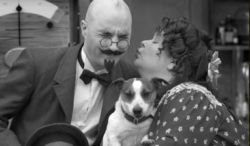Stuart:
Rolf de Heer has got to be a national treasure. There is very little that connects Alexandra’s Project, The Tracker, Ten Canoes or The Old Man Who Read Love Stories, particularly in terms of tone. Some of his films are for me, some aren’t, but all tread a new path for de Heer – he’s not one to repeat himself.
 Above all, Dr. Plonk is an extremely entertaining throwback to the days of early cinema. I’m always surprised just how entertaining silent movies can be. Though initially dreading the prospect of 101 minutes of For the Term of His Natural Life, I ended up loving it, and the same is true of Dr. Plonk. As with Charlie Chaplin’s films, de Heer’s flick is a wonderful blend of innocent slapstick and socio-political critique. What other type of film could blend slipping on a banana peel with jabs at the war on terror?
Above all, Dr. Plonk is an extremely entertaining throwback to the days of early cinema. I’m always surprised just how entertaining silent movies can be. Though initially dreading the prospect of 101 minutes of For the Term of His Natural Life, I ended up loving it, and the same is true of Dr. Plonk. As with Charlie Chaplin’s films, de Heer’s flick is a wonderful blend of innocent slapstick and socio-political critique. What other type of film could blend slipping on a banana peel with jabs at the war on terror?
Set in 1907, the film concerns the titular inventor, his deaf assistant Paulus, wife Mrs. Plonk and dog Tiberius. The plot primarily concerns Plonk stumbling upon the date on which the world will end, and then doing his darndest to warn everyone. The film stock hasn’t been dirtied up too much (you’d never confuse it for a feature made early last century), but it does have that sped-up feel to it. The hokey set design and props give this already retro concept a naïve and old-fashioned feeling. De Heer references (or is inspired by) not only Chaplin but other silent movies such as Carl Theodor Dreyer’s Vampyr (Vampyr – Der Traum des Allan Grey), particularly with the windowed coffin Plonk uses to travel through time.
First-timer Nigel Lunghi plays the titular Dr. with aplomb. The legend goes that de Heer found him juggling in Adelaide’s Rundle Mall, and he gets to use his street performing abilities to the fullest here. Magda Szubanski (Mrs. Plonk) is brilliant, and whilst it seems she doesn’t get as much work as she should, her performances are always memorable.
The film forms a strange temporal equation – de Heer has used old-fashioned filming techniques to tell a story of someone travelling to our present to warn his past of the future. It’s a wonderfully inspired idea as reflexive as it is reflective. It’s a really enjoyable film, and only falters with a climax that goes on a tad too long.
Rating: